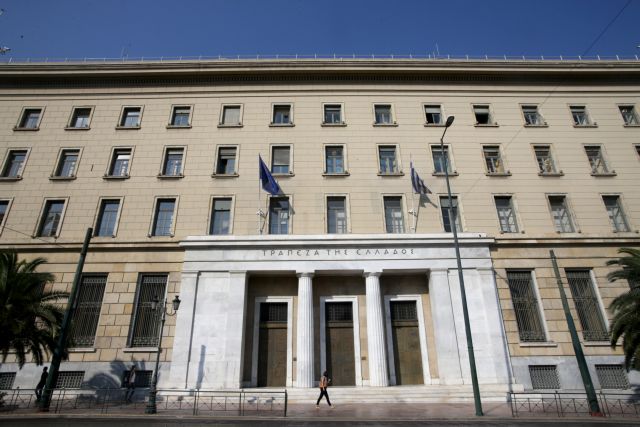The current account deficit decreased for the first two months of the year, according to official data from the Bank of Greece. The larger decrease in imports compared to exports contributed to the deficit of 1.3 billion euros in the two months of January-February, 1.2 billion euros less than in the same period of 2020.
Current Balance
In February 2021, the current account balance showed a deficit of € 840 million, an improvement of € 314 million compared to February 2020. This development came from the improvement of the balance of goods and primary income, which was partially offset by deterioration of service and secondary income balances.
The decrease in the goods deficit is due to the increase in the value of exports by 9.5% and the decrease in the value of imports by 5.1%, developments that are mainly due to changes in the value of exports and fuel imports. At constant prices, exports increased by 11% and imports decreased by 10.7%. Also, exports of non-fuel goods increased by 2.4% and the corresponding imports decreased by 1.1%, at constant prices.
The reduction of the surplus of the service balance is due to the deterioration in all sub-balances compared to the same month of 2020. Arrivals of non-resident travelers and related receipts decreased by 87.8% and 89.4% respectively. The transport surplus decreased by 17.8%, mainly due to the decrease in net maritime revenues (by 7.5%).
In February 2021, the primary income balance surplus more than doubled, mainly due to the reduction of net payments for interest, dividends, and profits. The secondary income balance recorded a deficit, compared to a surplus in the corresponding month of 2020, mainly due to the increase in general government disbursements.
In the period January-February 2021, the current account balance showed a deficit of 1.3 billion euros, 1.2 billion euros less than in the same period of 2020. This development is due to the reduction of the goods deficit, as well as in improving the primary and secondary income balances, which were partially offset by the reduction of the services surplus.
The decrease in the goods deficit is due to the larger decrease in imports compared to exports. In particular, exports decreased by 2.4% at current prices and imports decreased by 11.2%. It is noted that exports of goods at constant prices increased by 3.6%.
The reduction in the services surplus is due to the deterioration of the travel and transport services balance, while the balance of other services has improved. Arrivals of non-resident travelers and related receipts decreased by 87.9% and 90.3% respectively compared to the same period of 2020. Receipts from transfers decreased by 17.1%. Finally, primary and secondary income surpluses have improved significantly.
Capital Balance
In February 2021, the capital balance showed a deficit of 3.2 million euros, compared to a surplus of 107 million euros in the corresponding month of the previous year. In January-February 2021, the capital surplus improved compared to the same period in 2020 and amounted to 480 million euros, due to the increase in transfers from the EU to general government.
Total Balance of Current Transactions and Capital
In February 2021, the total current account and capital deficit (which corresponds to the needs of the economy for foreign financing) decreased to 844 million euros, from 1.0 billion euros in February 2020. In January -February 2021, the total current account and capital balance recorded a deficit of 796 million euros, compared to 2.3 billion euros in the corresponding period of 2020.
Financial Transaction Balance
In February 2021, in the category of direct investments, residents’ receivables from abroad recorded a small increase of 21 million euros. Residents’ liabilities to foreign countries increased by 259 million euros.
In portfolio investment, the increase in residents’ receivables from abroad is mainly due to the 2.0 billion increase in their holdings in stocks and bonds abroad. The increase in their liabilities is almost entirely due to the increase by 2.3 billion euros of non-resident placements in repos and bonds of the Greek State.
In the category of other investments, there was a decrease in residents ‘receivables from abroad due to the decrease by 757 million euros of residents’ deposits and repos abroad, which was partially offset by the increase by 362 million euros in loans to non-residents. The small decrease in their liabilities reflects on the one hand the decrease by 1.3 billion euros of non-resident deposits and repos in Greece (including the TARGET account) and on the other hand the increase by 1.1 billion euros of loan liabilities abroad.
In the period January-February 2021, in the category of direct investments, residents ‘receivables from abroad increased by 45 million euros and residents’ liabilities abroad, corresponding to direct investments of non-residents in Greece, increased by 585 million.
In portfolio investments, the net increase in residents ‘receivables from abroad is mainly due to the € 4.5 billion increase in residents’ investments in repos and bonds abroad. The net increase in their liabilities is due to the increase by 1.4 billion euros of non-residents’ investments in Greek government bonds and interest-bearing bills.
In the category of other investments, the increase in residents’ receivables from abroad is mainly due to the increase by 498 million euros of loans granted to non-residents and the 166 million euro statistical adjustment, which is linked to the issuance of euro banknotes, which were partially offset by a € 637 million reduction in residents’ deposits and repos abroad. The increase in their liabilities mainly reflects the increase by 2.8 billion euros of non-resident deposits and repos in Greece (including the TARGET account) and the increase by 632 million euros of their loan liabilities to non-residents.
At the end of February 2021, the country’s foreign exchange reserves amounted to 9.2 billion euros, compared to 7.8 billion euros at the end of February 2020.







































